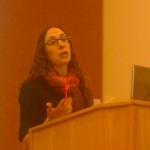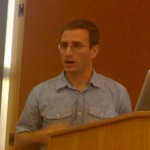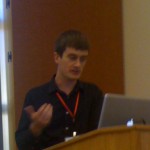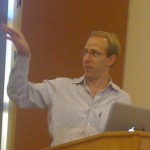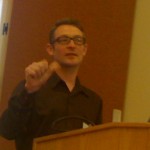DH2011 panel presenters included:
[top row] Robert Allen, Pamella Lach, Todd Presner
[middle row] David Shepard, Christopher Johanson, Chien-Yi Hou
[bottom row] Richard Marciano, Chris Speed.
Panel theme:
The last five years have seen the flowering of what we might call virtual cities/digital histories: interactive, online resources for recovering, documenting, representing, and sharing histories of urban spaces. These digital projects take advantage of relational databases to manage digitized multi-media content and GIS to locate this content spatially and represent it on historical or contemporary interactive maps.
Recent projects:
Digital Harlem: http://heur-db-pro-1.ucc.usyd.edu.au/HEURIST/harlem/
Philaplace: http://www.philaplace.org/
Historypin: http://www.historypin.com/
Mapping Medieval Chester: http://www.medievalchester.ac.uk/index.html
Mapping Performance Culture – Nottingham: http://www.nottingham.ac.uk/mapmoment/
Virtual Kyoto: http://www.geo.lt.ritsumei.ac.jp/webgis/ritscoe.html
MediaNola: http://www.medianola.org
Museum of London Street Museum: http://www.museumoflondon.org.uk/Resources/app/you-are-here-app/home.html
These projects benefit from and are informed by the more general development of digital history; the spatial “turn” in the humanities; the mass digitization and publication of archival material by scholars, libraries, and museums around the world; and the general public’s increasing reliance upon and familiarity with GIS maps. These projects are inherently interdisciplinary, and reflect a variety of institutional settings and agendas: academic historical and geographic research, museums, libraries, archives, community organizations, and historical preservation, among them. Within the academy, they engage scholars from history, geography, architecture, urban studies, information and library science, and cultural studies, among other fields. Their production necessarily involves collaboration across intellectual domains and areas of practice.
This session aims to raise a number of issues arising from this realm of digital humanities work that we feel will be of relevance to a wide range of digital humanities theorists and practitioners:
– interdisciplinary and inter-institutional collaboration in digital history projects
– data presentation and interpretation
– curated and user-generated content
– the use of historic maps in digital history
– involving community organizations in digital history projects
– digital history and ubiquitous learning
– mobile, computer-based, and site-specific applications
– addressing diverse audiences in digital history projects
– scalability and sustainability of digital history projects
The panel brings together practitioners in this emerging area of digital humanities around the presentation and discussion of innovative virtual cities/digital history projects in whose development they have played key roles.


